小学六年级英语(上册)知识归纳|人教版 笔记 重点
(完整版)新人教版英语六年级上册知识点总结
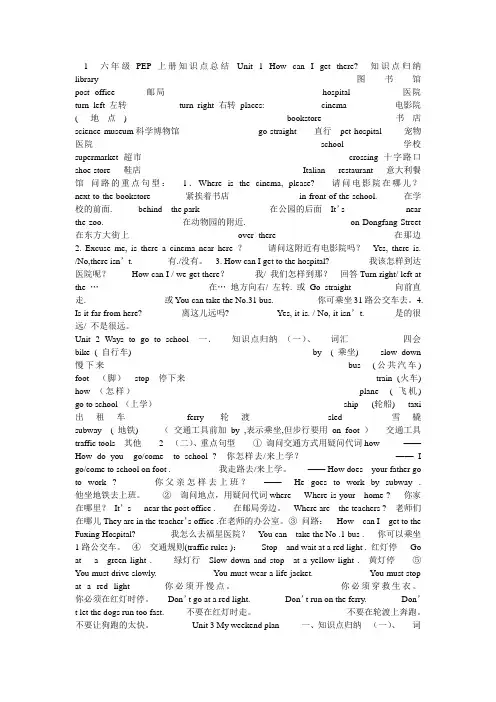
1 六年级PEP上册知识点总结Unit 1 How can I get there? 知识点归纳library 图书馆post office 邮局hospital 医院turn left 左转turn right 右转places: cinema 电影院( 地点) bookstore 书店science museum科学博物馆go straight 直行pet hospital 宠物医院school 学校supermarket 超市crossing 十字路口shoe store 鞋店Italian restaurant 意大利餐馆问路的重点句型:1.Where is the cinema, please? 请问电影院在哪儿?next to the bookstore 紧挨着书店in front of the school. 在学校的前面. behind the park 在公园的后面It’s near the zoo. 在动物园的附近. on Dongfang Street 在东方大街上over there 在那边2. Excuse me, is there a cinema near here ?请问这附近有电影院吗?Yes, there is. /No,there isn’t. 有./没有。
3. How can I get to the hospital? 我该怎样到达医院呢?How can I / we get there?我/ 我们怎样到那?回答Turn right/ left at the …在…地方向右/ 左转. 或Go straight 向前直走. 或You can take the No.31 bus. 你可乘坐31路公交车去。
4. Is it far from here? 离这儿远吗? Yes, it is. / No, it isn’t. 是的很远/ 不是很远。
Unit 2 Ways to go to school 一.知识点归纳(一)、词汇四会bike ( 自行车) by ( 乘坐) slow down 慢下来bus (公共汽车) foot (脚)stop 停下来train (火车) how (怎样)plane ( 飞机) go to school (上学)ship (轮船) taxi 出租车ferry 轮渡sled 雪橇subway ( 地铁) (交通工具前加by ,表示乘坐,但步行要用on foot )交通工具traffic tools 其他 2 (二)、重点句型①询问交通方式用疑问代词how ——How do you go/come to school ? 你怎样去/来上学?——I go/come to school on foot . 我走路去/来上学。
完整版)人教版六年级英语上册知识点汇总总结提纲
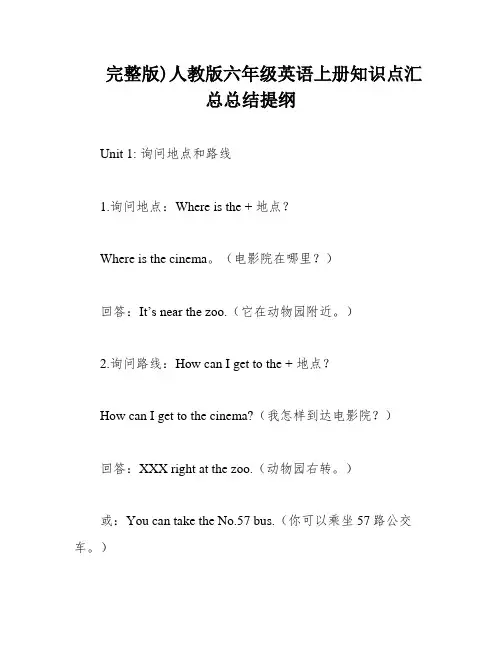
完整版)人教版六年级英语上册知识点汇总总结提纲Unit 1: 询问地点和路线1.询问地点:Where is the + 地点?Where is the cinema。
(电影院在哪里?)回答:It’s near the zoo.(它在动物园附近。
)2.询问路线:How can I get to the + 地点?How can I get to the cinema?(我怎样到达电影院?)回答:XXX right at the zoo.(动物园右转。
)或:You can take the No.57 bus.(你可以乘坐57路公交车。
)Unit 2: 交通方式1.询问某人怎样去某地:How do某人go(come) to + 地点?How do you go to school?(你怎么去学校?)回答:I go to school on foot.(我走路去学校。
)2.规定某人必须做某事:某人 + must + 动词原形XXX.(骑自行车的人必须戴头盔。
)I must pay n to the traffic XXX.(我必须注意交通信号灯。
)Unit 3: 打算做某事某人 + be going to + do(动词原形)She is going to see a film.(她打算去看电影。
)My uncle is planningXXX to go to the supermarket。
In this unit。
there are several types of ns that we can use to XXX。
For example。
we can ask "What are you going to do (+time or place)?" or "When are you going (+place)?" to get an XXX may include phrases such as "I am going to the cinema tomorrow" or "They are going to Nanjing next week."Similarly。
新编人教版六年级英语上册知识重点总结
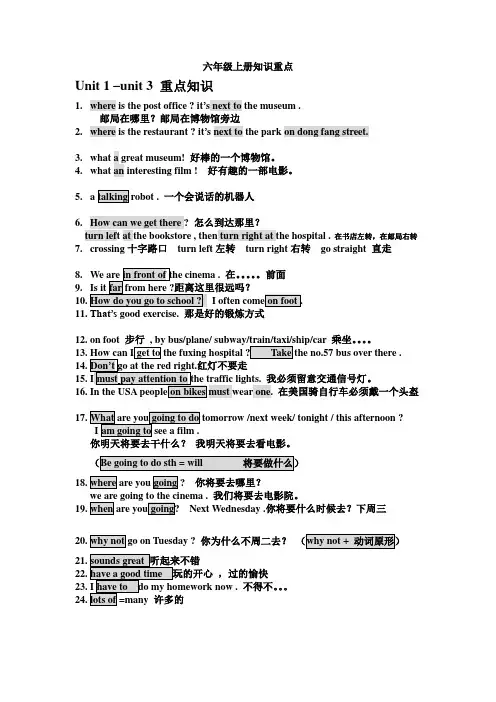
六年级上册知识重点Unit 1 –unit 3 重点知识1.where is the post office ? it’s next to the museum .邮局在哪里?邮局在博物馆旁边2.where is the restaurant ? it’s next to the park on dong fang street.3.what a great museum! 好棒的一个博物馆。
4.what an interesting film ! 好有趣的一部电影。
5.一个会说话的机器人6.How can we get there ? 怎么到达那里?turn left at the bookstore , then turn right at the hospital .在书店左转,在邮局右转7.crossing十字路口turn left左转turn right右转go straight 直走8.在。
前面9.10.11.12.乘坐。
13.14.15.I must pay attention to the traffic lights. 我必须留意交通信号灯。
16.In the USA people on bikes must wear one. 在美国骑自行车必须戴一个头盔17.18.你将要去哪里?我们将要去电影院。
19.Next Wednesday .你将要什么时候去?下周三20.你为什么不周二去?21.22.,过的愉快23.不得不。
24.unit 4-unit6 重点知识25.what are your his/her hobbies ?26.练习功夫27.28.中国歌曲Chinese song 好主意good idea 很有趣that’s interesting29.He lives on a farm.30.31.32.33.go—likes34.他/35.(同义句36.,I want to be a businessman .37.他在海上工作。
人教版六年级上册英语知识点汇总
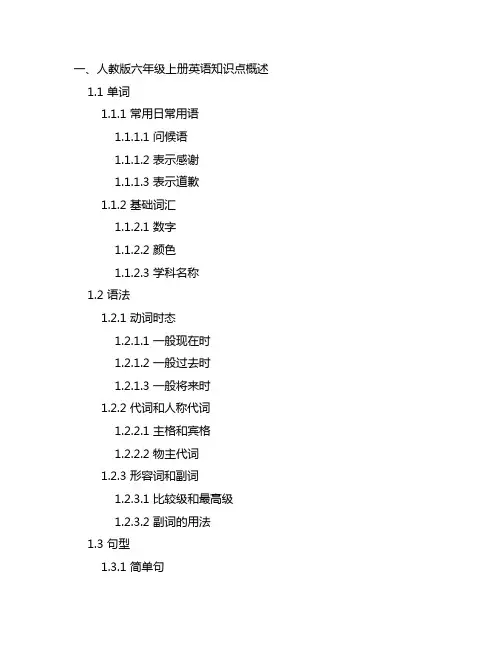
一、人教版六年级上册英语知识点概述1.1 单词1.1.1 常用日常用语1.1.1.1 问候语1.1.1.2 表示感谢1.1.1.3 表示道歉1.1.2 基础词汇1.1.2.1 数字1.1.2.2 颜色1.1.2.3 学科名称1.2 语法1.2.1 动词时态1.2.1.1 一般现在时1.2.1.2 一般过去时1.2.1.3 一般将来时1.2.2 代词和人称代词1.2.2.1 主格和宾格1.2.2.2 物主代词1.2.3 形容词和副词1.2.3.1 比较级和最高级1.2.3.2 副词的用法1.3 句型1.3.1 简单句1.3.1.1 肯定句1.3.1.2 否定句1.3.1.3 疑问句1.3.2 复合句1.3.2.1 并列句1.3.2.2 定语从句1.3.2.3 状语从句二、人教版六年级上册英语知识点详解2.1 单词2.1.1 常用日常用语2.1.1.1 问候语问候语是指在英语日常交际中用于打招呼和示好的常用词汇,包括Hello、Hi、Good morning、Good afternoon等等。
2.1.1.2 表示感谢表示感谢的常用词汇有Thank you、Thanks a lot、Thank you very much等,用于表达对别人的帮助或礼物表示感激之情。
2.1.1.3 表示道歉表示道歉的词汇包括I'm sorry、Excuse me、Pardon等,在日常生活中,用于向别人道歉或请求对方让步的场合。
2.1.2 基础词汇2.1.2.1 数字数字是英语基础词汇的重要部分,包括基本的数字表达方式和计量单位,如one、two、three等,以及hundred、thousand等。
2.1.2.2 颜色颜色是描述事物外观的重要词汇,在日常交流中也经常用到,包括red、blue、yellow等常见颜色词汇。
2.1.2.3 学科名称学科名称涉及到人们日常生活和学习工作的方方面面,包括mathematics、music、art等,是学习英语时必须掌握的词汇。
小学英语人教精通版六年级上册重点归纳
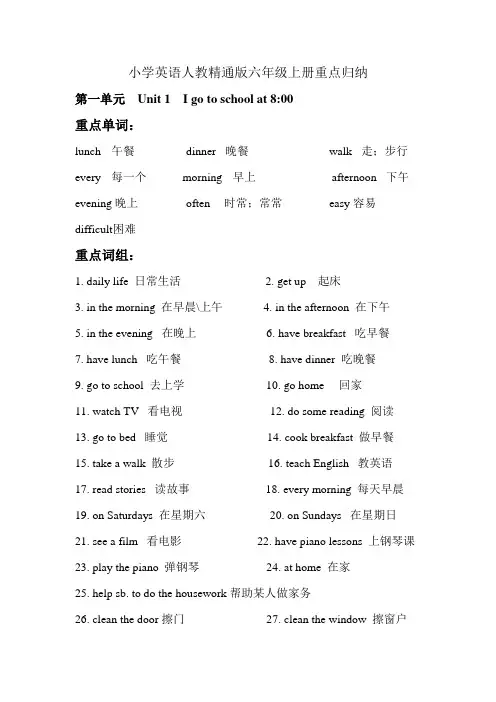
小学英语人教精通版六年级上册重点归纳第一单元Unit 1 I go to school at 8:00重点单词:lunch 午餐dinner 晚餐walk 走;步行every 每一个morning 早上afternoon 下午evening 晚上often 时常;常常easy 容易difficult困难重点词组:1. daily life 日常生活2. get up 起床3. in the morning 在早晨\上午4. in the afternoon 在下午5. in the evening 在晚上6. have breakfast 吃早餐7. have lunch 吃午餐8. have dinner 吃晚餐9. go to school 去上学10. go home 回家11. watch TV 看电视12. do some reading 阅读13. go to bed 睡觉14. cook breakfast 做早餐15. take a walk 散步16. teach English 教英语17. read stories 读故事18. every morning 每天早晨19. on Saturdays 在星期六20. on Sundays 在星期日21. see a film 看电影22. have piano lessons 上钢琴课23. play the piano 弹钢琴24. at home 在家25. help sb. to do the housework 帮助某人做家务26. clean the door 擦门27. clean the window 擦窗户28. clean the floor 擦地板重点句型:1.I don’t have breakfast at 7:00 in the morning . 我不是在早上七点钟吃早餐。
2.She gets up at 6:00 in the morning . 她在早上六点钟起床。
人教PEP版小学英语六年级上册全册总复习重点知识点归纳整理
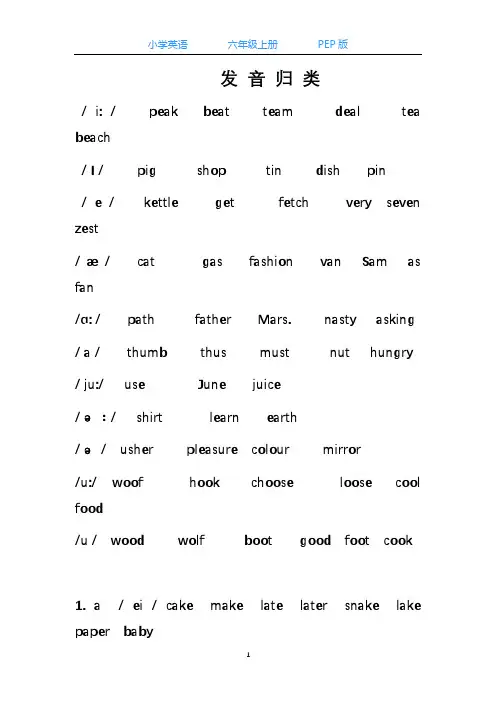
发音归类/ i: / peak beat team deal tea beach/ I / pig shop tin dish pin/ e / kettle get fetch very seven zest/ æ / cat gas fashion van Sam as fan/ɑ: / path father Mars. nasty asking / a / thumb thus must nut hungry / ju:/ use June juice/ ə:/ shirt learn earth/ ə / usher pleasure colour mirror/u:/ woof hook choose loose cool food/u / wood wolf boot good foot cook1. a / ei / cake make late later snake lake paper babya / æ /apple cat cap bag dad hat map black backa /ɑ:/ afternoon after banana dance lastclass glass grass grandma grandpa askfast fathera / ə/ china another woman breakfastaccountant bananaa / ɔ: / water a / ɒ/ watch wash want whata / i / orange2. e / i: / me he she these Chinese we returne / e / leg let bed pen desk yes egg3. i / ai / like kite bike drive time findlibrary excitedi / i / little fish big drink sit milk swimdig sister4. o / əu / Coke nose those close go homeno clotheso / ɒ/ lot dog holiday clock not boxodds hobby pot5. u / ju:/ use student cute excuse duty Tuesdayu / a / usher cut nut but bus cupjump much funnyu / ʊ / putu /u:/ June blue ruler superu / i / busy6. ea / i: / tea eat teacher please ice-creampeach jeans sneakers read meal beansclean season speak leaf leave(s) meaneast teach cleaner stream each sealseat beat wheatea / e / bread breakfast weatherea / ei / great7. ee /i:/ meet green three thirteen jeepqueen canteen sheep sweet beef weekend Halloween tree sleep need week feel seed deep between feet8. ow / au / brown how wow cow flowerdown now town crown shower ow / əu / yellow rainbow window snowy snow snowman know tomorrowrow show grow9. ou / au / mouth mouse out house ourplayground cloudy sour houseworkcloud about mountain southaccountant sprout loudou / u: / group soup coup10. th / ð / the this that these those fathermother brother with grandfathergrandmother clothes they themweather there either then othertogether anotherth / ө/ thank mouth birthday threethirteen thirty fourth eighth ninthtenth eleventh twelfth pathtwentieth thin Thursday healthynorth south month think themethinner thing something bathroom一、辨音,划线部分读音相同的打√,不同的打×(8%)()1. A. teacher B. bread()2. A. train B. wait()3. A. climb B. subway()4. A like B. pig()5. A foot B school()6. A bus B usually( ) 7.A stop B go( ) B plane二、找出划线部分发音不同与其他三个的单词。
(完整word版)人教版小学六年级上册英语知识点归纳
第六元
(完整 word 版)人教版小学六年级上册英语知识点归纳(word 版可编辑修改)
clean 干净的
二.句子: 1。There is a forest in the nature park.在自然公园里有一个森林。
2. Is there a forest in the park?
公园里面有一个森林吗?
第四单元
(完整 word 版)人教版小学六年级上册英语知识点归纳(word 版可编辑修改)
一. 单词: empty the trash 倒垃圾 cook the meals 做饭 water the flowers 浇花 sweep the floor 扫地 clean the bedroom 打扫卧室 make the bed 铺床 set the table 摆餐具 wash the clothes 洗衣服 do the dishes 洗碗碟 put away the clothes 收拾衣服 can't = cannot(不会;不能) use a computer(使用计算机)
(完整 word 版)人教版小学六年级上册英语知识点归纳(word 版可编辑修改)
4. Can you do housework? 你能会家务吗? --—--—Yes I can。是的,我会 No, I can’t,(but I'd like to have a try。)不,我不会,但我想试一试。(括号内的句子可以省略)
(完整版)新人教版英语六年级上册知识点总结
1 六年级PEP上册知识点总结Unit 1 How can I get there? 知识点归纳library 图书馆post office 邮局hospital 医院turn left 左转turn right 右转places: cinema 电影院( 地点) bookstore 书店science museum科学博物馆go straight 直行pet hospital 宠物医院school 学校supermarket 超市crossing 十字路口shoe store 鞋店Italian restaurant 意大利餐馆问路的重点句型:1.Where is the cinema, please? 请问电影院在哪儿?next to the bookstore 紧挨着书店in front of the school. 在学校的前面. behind the park 在公园的后面It’s near the zoo. 在动物园的附近. on Dongfang Street 在东方大街上over there 在那边2. Excuse me, is there a cinema near here ?请问这附近有电影院吗?Yes, there is. /No,there isn’t. 有./没有。
3. How can I get to the hospital? 我该怎样到达医院呢?How can I / we get there?我/ 我们怎样到那?回答Turn right/ left at the …在…地方向右/ 左转. 或Go straight 向前直走. 或You can take the No.31 bus. 你可乘坐31路公交车去。
4. Is it far from here? 离这儿远吗? Yes, it is. / No, it isn’t. 是的很远/ 不是很远。
Unit 2 Ways to go to school 一.知识点归纳(一)、词汇四会bike ( 自行车) by ( 乘坐) slow down 慢下来bus (公共汽车) foot (脚)stop 停下来train (火车) how (怎样)plane ( 飞机) go to school (上学)ship (轮船) taxi 出租车ferry 轮渡sled 雪橇subway ( 地铁) (交通工具前加by ,表示乘坐,但步行要用on foot )交通工具traffic tools 其他 2 (二)、重点句型①询问交通方式用疑问代词how ——How do you go/come to school ? 你怎样去/来上学?——I go/come to school on foot . 我走路去/来上学。
人教PEP版小学英语六年级上册Unit 1 知识点总结(讲义式)
小学英语 六年级上册 PEP版 1 Unit 1 How can I get there? 一、地点词汇 library 图书馆 post office 邮局 hospital 医院 turn left 左转 turn right 右转 cinema 电影院 bookstore 书店 go straight 直行 science museum科学博物馆
crossing 十字路口 supermarket 超市 school 学校
二、描述某地点所处位置的短语 near 在…..附近 next to 与…..相邻 beside 在…..旁边 in front of 在……前面 behind 在 …..后面 between 在…..之间
三、问路 1.Where is the cinema, please? 请问电影院在哪儿? 小学英语 六年级上册 PEP版 1 next to the hospital. 在医院的旁边。 in front of the school.在学校的前面. It’s behind the park . near the zoo. 在动物园的附近. far from here. 离这儿很远.
2. Excuse me, is there a cinema near here. 请问这附近有电影院吗? Yes, there is. /No,there isn’t.有./没有。
3. How can I/we get there? 我怎样到那儿? Turn left at the bookstore. 到书店左转
4. How can I get to the hospital? 我该怎样到达医院呢? Take the No.57 bus. 乘坐第57路公汽。 By the No. 57 bus. 小学英语 六年级上册 PEP版
1 注意:到那儿 get there到某地 get to Canada/Australia/Beijing/ Shanghai/Wuhan get to the hospital/zoo/bookstore
人教版六年级英语上册各单元知识点汇总
人教版六年级英语上册各单元知识点汇总Unit 1 How can I get there?重点词汇:hospital 医院 cinema 电影院post office 邮局 bookstore 书店museum 博物馆 go straight 直走turn right 右转 turn left 左转crossing 十字路口 science 科学turn 转弯 left 左straight 笔直地 right 右重点句型:1. —Where is the...? ……在哪里?—It's near/next to the...它在……附近/ 与……相邻。
2.How can I get to the...?我怎么去……?3.Turn right./Turn left./Go straight.右转。
/左转。
/直走。
问(ask)路和指(tell)路英语中常见问路的表达方法:Excuse me, where is+地点, please?Excuse me, how can I get to+地点?Excuse me, can you tell me where+地点+is?英语中常见指路的表达方法:It's+表示位置的短语.Turn left/right at+地点.Go straight along+地点.常见的方位介词及短语:1. in表示“在……里面”。
2. on表示“在……上面”,但两者互相接触。
3. under表示“在……下方”。
4. behind表示“在……后面”。
5. in front of表示“在……前面”,正好与behind相反。
6. beside 表示“在……旁边”。
7. above 表示“在……上面”,但两者不接触。
8. between 表示“在……中间”。
9. near表示“在……附近”。
10. next to 表示“在……附近”,相当于near。
11. in the middle of 表示“在......中间”12.over在……上面;从……上方;穿越;over there在那里Unit 2 Ways to go to school重点词汇:bus 公共汽车 plane 飞机taxi 出租汽车 ship (大)船subway 地铁 train 火车by (表示方式)乘 on foot 不行stop 停下 slow 慢的down 减少;降低 slow down 慢下来重点句型:1.How do you get to...? 你怎么去……?2.I usually/often/sometimes come to school on foot/by...我通常/经常/有时候步行/乘……来学校。
- 1、下载文档前请自行甄别文档内容的完整性,平台不提供额外的编辑、内容补充、找答案等附加服务。
- 2、"仅部分预览"的文档,不可在线预览部分如存在完整性等问题,可反馈申请退款(可完整预览的文档不适用该条件!)。
- 3、如文档侵犯您的权益,请联系客服反馈,我们会尽快为您处理(人工客服工作时间:9:00-18:30)。
小学六年级英语(上册)知识归纳|人教版Unit 1 How do you go to school?一、重点短语:by plane 坐飞机by ship 坐轮船on foot步行by bike 骑自行车by bus 坐公共汽车by train 坐火车trafficlights交通灯traffic rules交通规则go to school 去上学get to 到达get on上车get off下车Stop at a red light. 红灯停Wait at ayellow light. 黄灯等Go at a green light. 绿灯行二、重点句型:1.How do you go to school?你怎么去上学?ually I go to school on foot. SometimesI go by bus.通常我步行去上学。
有时候骑自行车去。
3.How can I get to Zhongshan Park ?我怎么到达中山公园?4.You can go by the No. 15 bus. 你可以坐15路公共汽车去。
三、重点语法:1、There are many waysto go somewhere.到一个地方去有许多方法。
这里的ways一定要用复数。
因为there are是There be句型的复数形式。
2、on foot 步行乘坐其他交通工具大都可以用介词by…,但是步行只能用介词on 。
4、go to school的前面绝对不能加the,这里是固定搭配。
5、USA 和US 都是美国的意思。
另外America也是美国的意思。
6、go to the park 前面一定要加the. 如果要去的地方有具体的名字,就不能再加the ,如果要去的地方没有具体名字,都要在前面加the. (go to school除外。
)7、How do you go to …?你怎样到达某个地方?如果要问的是第三人称单数,则要用:How does he/she…go to …?8、反义词:get on(上车)---get off(下车)near(近的)—far(远的)fast(快的)—slow(慢的)because(因为)—why(为什么)same(相同的)—different(不同的)9、近义词:see you---goodbye sure---certainly---ofcourse10、频度副词:always 总是,一直usually 通常often经常sometimes 有时候never 从来不Unit 2 Where is the science museum?一、重点短语:library 图书馆post office 邮局hospital医院cinema 电影院bookstore书店science museum科学博物馆turnleft向左转turn right 向右转go straight 直行north北south南east东west西next to靠近、与……。
相邻then 然后二、重点句型:1.Where is the cinema,please?请问电影院在哪里?2.It’s next to thehospital. 它与医院相邻。
3.Turn left at the cinema,then gostraight. It’s on the left. 在电影院向左转,然后直行。
它在左边。
三、重点语法:1、问路时要用"excuse me对不起,打扰一下"2、描述路时可以用顺序词:first首先,next接着,then然后3、near 表示在附近,next to表示与…相邻。
它的范围比near小。
in front of 在。
前面behind 在……后面4、在左边,在右边介词要用on,on theleft/on the right,但是东西南北,介词要用in,in the north/east/south/west.5、for 表示持续多长时间,当表示做某事多长时间都要用for.? 如:Walk east for 5 minutes.?? Then walk straight for three minutes.6、乘几路车可以用by the No.301bus,注意No.中N要大写,后面要加点。
如果要用动词可以用take,例如take the No.301 bus.7、当表示某个地方在另一个地方的哪一方向时,要用介词of。
如:the hospital is east of the cinema. 医院在电影院的东边。
8、表示在哪儿转时,用介词at。
如:Turn left at thebank。
在银行左转。
9、find表示"找到",强调找的结果。
Lookfor表示"寻找",强调找的过程。
10、在几点前面要用介词at,如at 7p.m.11、英文的书信与中文的书信不完全一样:开头:英语是在人称后面加逗号,中文是加冒号。
正文:英语是空三个或者五个字母写,中文要空两个中文字格。
结尾:英语的落款与人名是顶格而且是分开写的。
中文则是另起一行,放在一起且稍靠后一点儿的地方。
英文名字的书写要注意下。
12、近义词:bookstore==bookshop 书店gostraight==go down直行afterschool==after class 放学后13、反义词或对应词:here (这里)---there(那里)east(东)---west(西)north(北)---south(南)left(左)---right(右)get on (上车)---getoff(下车)14、in the front of…表示在…的前面,是指在该地方的范围内,in front of而则表示在该地方的范围外。
如:in front of our classroom是指在教室的外面而且在教室的前面。
而inthe front of classroom则是指在教室里的前面。
15. be far from…表示离某地远。
be 可以是am ,is ,are.My home is not far from school.我家离学校不远。
Unit 3 What are you going to do ?一、重点短语:this morning 今天上午this afternoon 今天下午thisevening今天晚上next week 下周tomorrow 明天tonight 今晚post card 明信片comic book漫画书newspaper报纸二、重点句型:1.What are you going to do on the weekend?你周末打算做什么?2.I’m going to visit mygrandparents this weekend?这个周末我打算去看望我的外祖父母。
3.Where are you going this afternoon?你今天下午打算去哪里?4.I’m going to thebookstore.我打算去书店。
5.What are you going to buy?你打算去买什么?6.I’m going to buy a comicbook.我打算去买一本漫画书。
三、重点语法:1、What are you goingto do?你想做什么?询问他人在未来的打算。
be going to 后面要跟动词的原形。
注意be going to be 意思是"打算成为什么,干什么职业。
"注意一下句子的区别,找出正确回答。
What are yougoing to do this afternoon?What are you going tobuy?What are you going to be?When? are you going?Where are yougoing?Howareyougoing?Who are you going with?2、this evening 和tonight的区别:this evening指的是今天晚上睡觉以前的时间,一般指晚上十二点以前。
而tonight指的是今晚,一般是指一整晚的时间,通宵。
3、P30写周末的作文的模板4、部分疑问代词的意义与用法:(1)What 什么。
用来问是什么,做什么,叫什么,什么样等等。
如:What is your name? 你的名字叫什么?What is your father? 你爸爸是干什么的?What is your hobby?你的爱好是什么?What is your favourite food?你最喜爱的食物是什么?What's your math teacher like? 你的数学老师长得什么样子? (2)Where ,在哪里,到哪里。
用来问地点。
如:Where are you from?你从哪里来?Where are you going to ?你打算去哪里?Where is my ruler?我的尺子在哪里?(3)When,什么时候。
用来问时间。
如:When is your birthday? 你的生日是什么时候?When are you going to ?你打算什么时候去?When do you go to school?你什么时候去上学?(4)what time 几点了。
用来问具体的时间,如:What time is it? 现在几点了?(5)What colour什么颜色。
用来问物体的颜色。
如:What colour is your schoolbag?你的书包是什么颜色的?(6)What kind of 什么种类。
用来问类别。
如What kind of fruit do you like?你最喜欢哪一种水果?(7)who谁。
用来问人物是谁。
如:Who is your English teacher ?你的英语老师是谁?Who's that man? 那个男人是谁?(8) whose谁的。
用来问物体的主人是谁?如:Whose pencil is this? 这是谁的铅笔?Whose bike is blue? 谁的自行车是蓝色的?(9) which哪一个。
用来问具体的哪一个。
如:Which season do you like best?你最喜欢哪个季节?Which pencil is ken's? the long one or theshort one?哪只铅笔是Ken的?长的那支还是短的那支?(10)how怎样?用来问身体状况,或者事情的状况,对事件的看法等。
